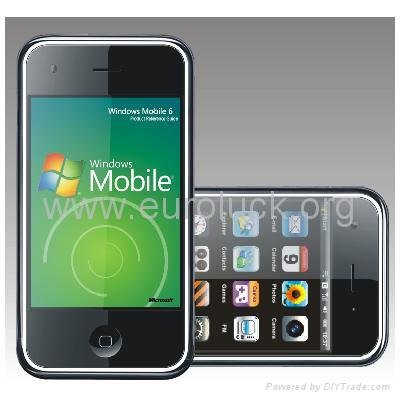I like to research, use, and report on the iPhone clones. Recently, the smaller or "mini" models have become very popular. Often, I'm asked about the "mini iPhone clone." I often have to ask a few follow up questions to determine which model the person means. Most often, they are either asking about the CECT i9, the P168S or the very small M188. I'll go over some of the features of all of these phones to help you determine which may work better for your needs.

The Very Popular CECT i9: This is probably the most frequently purchased clone on the market right now. Although it is the largest of all three of the phones that I've mentioned, it is smaller than the iPhone and the original clones, weighing in at around 95 -100 grams. It is also a bit skinnier than most clones. What makes this phone so popular is that it is said to "combine the best of everything" in the clone world. It's dual sim, is a quad band, has the shake and tilt feature, Java support, and everything else. Also, you can have both sim cards online at one time so that you aren't having to switch back and forth between them. Priced in the low $100 range, this phone is a good fit for many consumers.
The P168S: This phone is based on the original popular iClone, the P168. But, it has been upgraded to include shake and tilt. This one is a bit smaller than the i9, at around 85 grams. However, this one (when it is correctly labeled - some sellers confuse or mess up the names) doesn't have Java. But, if this is not a draw back for you, the S model does have just about everything else with a smaller size.
The Smallest iPhone Of All - The M188: Probably the smallest clone on the market right now is the M188. This tiny phone only weighs 75 grams and is about the size of a credit card. It also comes in a gold finish which is pretty popular. Additionally, it has all of the popular features as well as "swing or shake to the music," but it is a tri band rather than a quad band. And, it doesn't support Java. Many folks can use a tri band just fine. Just make sure with your carrier that you aren't on the 850 MHZ band to be totally sure.
So, Which Is Best For You: Which one of these phones work out to be best for you largely depends on what is most important to you. If you want the smallest iPhone available, the M188 wins. But, if you want a small and compact phone with all of the features available, including Java, the i9 may be preferable. I often find when consumers have all three of these phones in their hand, they sometimes find that the super tiny models are a bit harder to manipulate and enter data into. But, this decision is really a personal one. All three of these are great phones that will do most everything that the original can do without the weight and size.

The Very Popular CECT i9: This is probably the most frequently purchased clone on the market right now. Although it is the largest of all three of the phones that I've mentioned, it is smaller than the iPhone and the original clones, weighing in at around 95 -100 grams. It is also a bit skinnier than most clones. What makes this phone so popular is that it is said to "combine the best of everything" in the clone world. It's dual sim, is a quad band, has the shake and tilt feature, Java support, and everything else. Also, you can have both sim cards online at one time so that you aren't having to switch back and forth between them. Priced in the low $100 range, this phone is a good fit for many consumers.
The P168S: This phone is based on the original popular iClone, the P168. But, it has been upgraded to include shake and tilt. This one is a bit smaller than the i9, at around 85 grams. However, this one (when it is correctly labeled - some sellers confuse or mess up the names) doesn't have Java. But, if this is not a draw back for you, the S model does have just about everything else with a smaller size.
The Smallest iPhone Of All - The M188: Probably the smallest clone on the market right now is the M188. This tiny phone only weighs 75 grams and is about the size of a credit card. It also comes in a gold finish which is pretty popular. Additionally, it has all of the popular features as well as "swing or shake to the music," but it is a tri band rather than a quad band. And, it doesn't support Java. Many folks can use a tri band just fine. Just make sure with your carrier that you aren't on the 850 MHZ band to be totally sure.
So, Which Is Best For You: Which one of these phones work out to be best for you largely depends on what is most important to you. If you want the smallest iPhone available, the M188 wins. But, if you want a small and compact phone with all of the features available, including Java, the i9 may be preferable. I often find when consumers have all three of these phones in their hand, they sometimes find that the super tiny models are a bit harder to manipulate and enter data into. But, this decision is really a personal one. All three of these are great phones that will do most everything that the original can do without the weight and size.